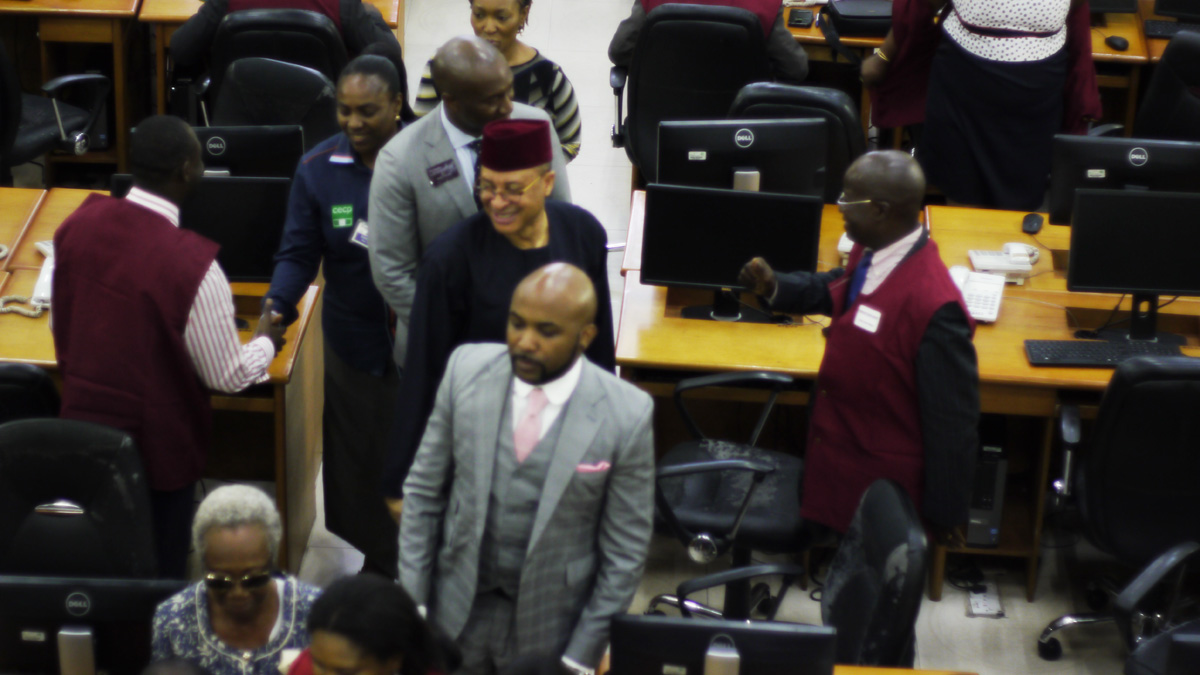- Equities Gain, Oando Share Price Drops by 9.54%
The Nigerian Stock Exchange market capitalisation appreciated by N14bn at the close of trading on Monday to close at N11.477tn from N11.463tn recorded on Friday last week.
A total of 322.814 million shares valued at N2.734bn were traded in 3,830 deals.
The equities market advanced by 0.12 per cent to bring the year-to-date return to 23.91 per cent. Similarly, volume of transactions advanced by 3.60 per cent, while market turnover declined by 16.40 per cent. The market recorded 23 gainers and 26 losers.
Unilever Nigeria Plc emerged as the top gainer of the day, advancing by 10.24 per cent, to close at N36.38. This was followed by Forte Oil Plc, 7-UP Bottling Company Plc, Champion Breweries Plc and Flour Mills Nigeria Plc, which appreciated by 7.71 per cent, 6.41 per cent, six per cent and five per cent, respectively.
Oando Plc emerged as the top loser with its share price dropping by 9.54 per cent to close at N6.83 from N7.55 after the Securities and Exchange Commission, on Friday, said it was going to investigate the firm.
This was followed by Nascon Allied Industry Plc, Aiico Insurance Plc, Skye Bank Plc and May & Baker Nigeria Plc, which depreciated by 4.95 per cent, 4.92 per cent, 4.92 per cent and 4.78 per cent, accordingly.
Sector performance as measured by the NSE indices showed that the NSE food/beverage and NSE industrial indices gained 1.29 per cent and 0.03 per cent, thus emerging as the only indices to record advancements in the day, while the NSE insurance, NSE oil/gas and NSE banking indices declined.
“We attribute today’s gain to the positive sentiments in the market, specifically in the consumer goods sector. In the remaining trading days of the week, we expect the release of the H1 2017 results to determine the performance of the market,” analysts at Meristem Securities Limited said in a post.
Meanwhile, Nasdaq and the NSE have officially announced that the Exchange has launched a new market surveillance platform powered by SMARTS, Nasdaq’s flagship surveillance solution.
The technology will, among other things, enable NSE to proactively monitor market manipulation (including spoofing and layering), detect and deter manipulative tendencies, gather intelligence, carry out traders’ monitoring and analysis, conduct multi-asset and cross-market surveillance, and execute risk-based supervision of flagged participants.
“As we enter the growth phase of the development of our market, including the introduction of new asset classes such as derivatives, there will be the imperative of processing significant volumes of market information in real-time to detect anomalies,” the General Counsel and Head of Regulation, NSE, Tinuade Awe, said.
“Through SMARTS, the NSE is leveraging the latest in surveillance technology and demonstrating its commitment to fostering a strong marketplace,” said Tony Sio, the Head of Exchange & Regulator Surveillance, Market Technology at Nasdaq.


 Naira3 weeks ago
Naira3 weeks ago
 News4 weeks ago
News4 weeks ago
 Naira4 weeks ago
Naira4 weeks ago
 Travel3 weeks ago
Travel3 weeks ago
 Naira3 weeks ago
Naira3 weeks ago
 Jobs3 weeks ago
Jobs3 weeks ago
 Naira3 weeks ago
Naira3 weeks ago
 Investment4 weeks ago
Investment4 weeks ago





























